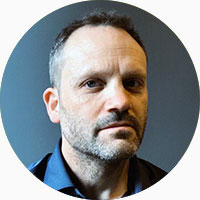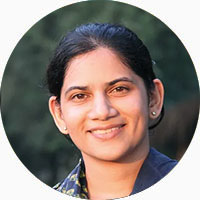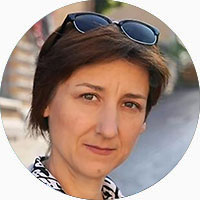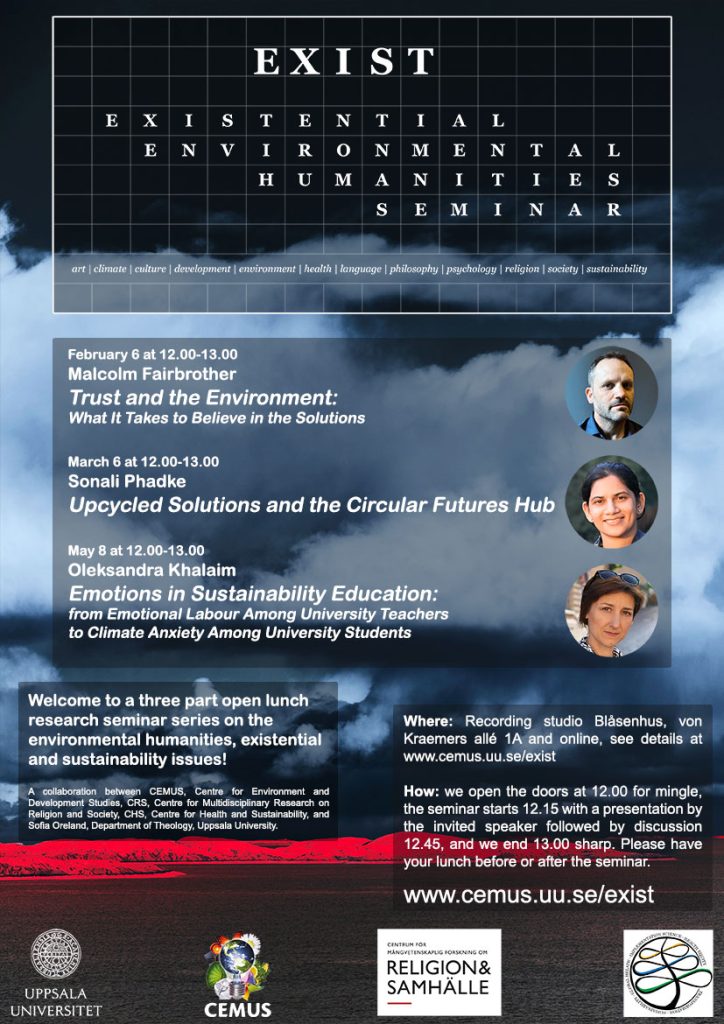Welcome to a three part open lunch research seminar series on the environmental humanities, existential and sustainability issues! This spring semester 2025, starting February 6!
When: February 6, March 6 and May 8 at 12.00-13.00
Where: Blåsenhus Recording Studio, von Kraemers allé 1A, Uppsala, see map here: https://link.mazemap.com/vtYD8KcT
Online: https://uu-se.zoom.us/j/66201001474
How: We open the doors at 12.00 for mingle, the seminar starts 12.15 with a presentation by the invited speaker followed by discussion 12.45, and we end 13.00 sharp. Please have your lunch before or after the seminar.
February 6 at 12.00-13.00
Malcolm Fairbrother Trust and the Environment: What It Takes to Believe in the Solutions
Moderated by Martha Middlemiss Lé Mon, CRS
 People around the world are concerned about climate change and other environmental problems, and want their governments to do something about them. But public support for many policies that experts recommend is low. The reason, I will argue, is predominantly a lack of trust. Drawing on data from a variety of studies, I will show that people with a high level of trust in their country’s political and administrative leaders and systems tend to support the enactment of more climate and environmental policies, but people with low levels of trust tend to be opposed. This includes even potential new institutions for the better representation of future generations.
People around the world are concerned about climate change and other environmental problems, and want their governments to do something about them. But public support for many policies that experts recommend is low. The reason, I will argue, is predominantly a lack of trust. Drawing on data from a variety of studies, I will show that people with a high level of trust in their country’s political and administrative leaders and systems tend to support the enactment of more climate and environmental policies, but people with low levels of trust tend to be opposed. This includes even potential new institutions for the better representation of future generations.
Bio
Malcolm Fairbrother is a professor of sociology at Uppsala University, Sweden, and a researcher at the Institute for Futures Studies, Stockholm. Originally from Vancouver, Canada, he received his PhD from the University of California, Berkeley (USA), worked in England for ten years, and has also been a visiting researcher at institutions in Mexico, Spain, and Italy. Using both qualitative and quantitive methods, his research is about the politics of environmental protection, long-term policymaking, economic globalization, and social and political trust.
March 6 at 12.00-13.00
Sonali Phadke Upcycled Solutions and the Circular Futures Hub
Moderated by Daniel Mossberg, CEMUS
 This seminar introduces the inspiring work of studio Alternatives focused on upcycling – rethinking waste as a resource – and practical examples of their work. studio Alternatives is a design firm based in Pune, India, specializing in creative reuse and upcycling. The studio focuses on transforming discarded materials into functional art and sustainable living spaces. Their projects range from upcycled products and furniture to innovative shipping container homes. By repurposing materials such as packaging, glass bottles, tires, and more, studio Alternatives emphasizes sustainability and environmental consciousness in their designs. During seminar we hope to explore research connections and get input on the newly started Circular Futures Hub, a collaborative project between CEMUS, studio Alternatives, Stephanie Foote, University of Vermont and Hilda Johansson, Uppsala University.
This seminar introduces the inspiring work of studio Alternatives focused on upcycling – rethinking waste as a resource – and practical examples of their work. studio Alternatives is a design firm based in Pune, India, specializing in creative reuse and upcycling. The studio focuses on transforming discarded materials into functional art and sustainable living spaces. Their projects range from upcycled products and furniture to innovative shipping container homes. By repurposing materials such as packaging, glass bottles, tires, and more, studio Alternatives emphasizes sustainability and environmental consciousness in their designs. During seminar we hope to explore research connections and get input on the newly started Circular Futures Hub, a collaborative project between CEMUS, studio Alternatives, Stephanie Foote, University of Vermont and Hilda Johansson, Uppsala University.
Bio
Sonali Phadke, co-founder studio Alternatives. Sonali comes with an engineering background and her family business in composites and plastics triggered her initial interest in reusing waste. Also, an alumni of The Ecological Society Pune has been a resource person for many environment/socio-economic projects and surveys. She has been an active member of Oikos for Ecological Services and was a part of the Maharashtra Environment Department-funded project on Eco-Education. She is also a team member of the Grassland Trust that works in grassland conservation from both the aspects of human and wildlife concerns. With her background, Sonali brings in the aspect of sustainability from the ecological perspective in the studio’s work.
https://www.cemus.uu.se/circular-futures/
May 8 at 12.00-13.00
Oleksandra Khalaim Emotions in Sustainability Education: from Emotional Labour Among University Teachers to Climate Anxiety Among University Students
Moderated by CHS
 As Dr. Avita Rath from the University of Edinburgh states in her blog, “In academia, we’re often expected to suppress our true selves, conform to a narrow definition of “professionalism,” and mask the real emotions that shape our experiences. This unseen, rarely acknowledged labor is a storm brewing beneath the surface of our work, threatening to drown us in a sea of burnout and exhaustion.” In our post-normal world full of wicked sustainability challenges, sustainability education turns to an immersive experience of (sometimes desperate) attempts to fix systems that have already passed their points of no-return. The seminar is devoted to a “grey zone” of emotions in sustainability education: what do students demand, how do teachers cope, and what kind of support we all need while crossing the post-normality ocean on our academic boat altogether.
As Dr. Avita Rath from the University of Edinburgh states in her blog, “In academia, we’re often expected to suppress our true selves, conform to a narrow definition of “professionalism,” and mask the real emotions that shape our experiences. This unseen, rarely acknowledged labor is a storm brewing beneath the surface of our work, threatening to drown us in a sea of burnout and exhaustion.” In our post-normal world full of wicked sustainability challenges, sustainability education turns to an immersive experience of (sometimes desperate) attempts to fix systems that have already passed their points of no-return. The seminar is devoted to a “grey zone” of emotions in sustainability education: what do students demand, how do teachers cope, and what kind of support we all need while crossing the post-normality ocean on our academic boat altogether.
Bio
Oleksandra has been working as a lecturer, educational developer, and researcher in the Centre of Health and Sustainability (CHS) being based at Campus Gotland since 2019. Her fields of interest include sustainability education, climate change as wicked problem, and future thinking as a part of Green Competences EU framework. Her most recent research (2021-2024) is about eco-emotions (climate anxiety) in higher education. She has been running a series of educational projects on how to use applied drama and gaming techniques in sustainability teaching for Campus Gotland staff in 2023-2025. She is an active member of ENLIGHT network trying to develop an interdisciplinary pedagogical toolbox for sustainability teaching across universities in Europe.
https://www.uu.se/en/contact-and-organisation/staff?query=N19-1962
See archive with seminars from previous semesters here.

